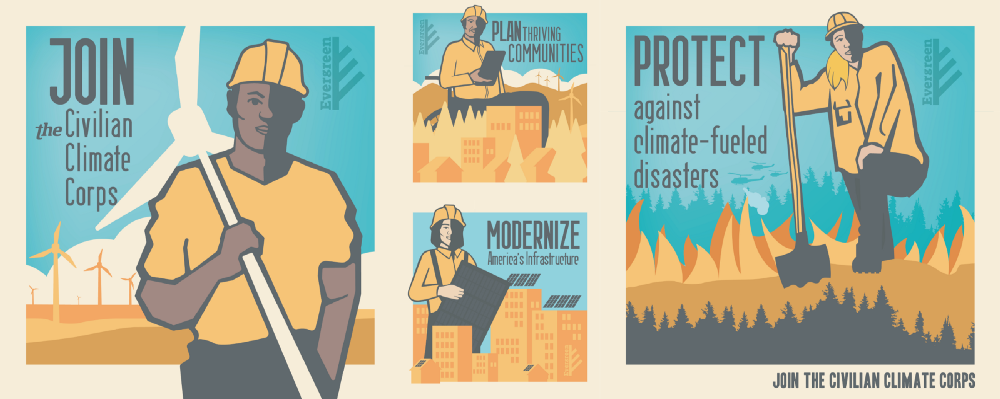
A new CCC is needed now — The Civilian Climate Corps
From a Blog Post of the Evergreen Action Group, July 19, 2021
A modern Civilian Climate Corps (CCC) will put American workers in the driver’s seat to confront the interlocking crises of climate change, environmental and racial injustice, and economic inequality.
As the climate crisis threatens lives and livelihoods, it also presents an opportunity to put millions of people to work building a just and sustainable clean energy economy. By giving young Americans the opportunity to lead this critical work in their own communities, a CCC will train a generation of climate leaders, kickstart the climate workforce mobilization, and devote resources to support historically underserved frontline communities.
The Impact: Harnessing The Power Of The American People To Defeat The Climate Crisis
As climate impacts like record-breaking heat waves and extreme summer storms put more Americans at risk with each passing year, it’s never been clearer that we need to invest now to make our communities climate resilient. That’s where the CCC comes in.
Whether they are managing forest restoration efforts to mitigate wildfires, installing efficient home cooling systems in areas vulnerable to rising heat, or helping a neighborhood get back on its feet after an unexpected flood, corpsmembers will be on the front lines of the climate crisis working to support the transition to a clean, resilient economy.
The Corps should take an expansive approach to climate action, tackling a range of projects including:
>>> Clearing brush and debris to mitigate wildfires
>>> Retrofitting homes for energy efficiency, clean electrification and climate resilience
>>> Collaborating with local governments to develop climate action plans
>>> Distributing aid in the wake of climate disasters
>>> Restoring coastal wetlands to buffer hurricanes and storm surges
>>> And much more!
The new CCC should give corpsmembers the financial support and benefits that allow them to thrive. Members should be paid a living wage, receive healthcare and childcare support, and get training that sets them up for stable careers in the clean economy. Corps branches should forge relationships with unions and local employers to build and support pre-apprenticeship programs and create clear pathways to long-term, family-sustaining careers. And corpsmembers who pursue postsecondary education at a public institution—whether a university, community college, technical school, or elsewhere—should also be eligible to receive full tuition reimbursement after their term of service. These high standards would ensure that the CCC is an entrypoint to good-paying, stable employment in the clean economy.
The Path: How A Civilian Climate Corps Can Be Established In Budget Reconciliation
Senate Democrats have confirmed that their proposed fiscal year 2022 budget framework contains “tens of billions of dollars” for a Civilian Climate Corps, but the Senate’s reconciliation rules place restrictions on how this CCC might be designed to meet the ambitious role it needs to play in building the clean economy.
To realize this vision, House and Senate lawmakers will have to work with authorizations already available in existing programs. That means funding existing national service programs—AmeriCorps, the Public Lands Corps, YouthBuild, and others—to handle more climate-related projects with enhanced standards and benefits. Because each existing program has its own strengths and specializations, the diverse investments here would adopt a holistic approach to climate action that works for communities across the country.
For example, more funding would go to Job Corps Civilian Conservation Centers, funded through the Department of Labor and operated by the U.S. Forest Service, which train and deploy teams of certified wildland firefighters. YouthBuild members, who are trained in construction, can work in collaboration with local unions to install new electric appliances and weatherize homes.
Each one of these programs would serve as an initiative of the Civilian Climate Corps. Corpsmembers working on these climate-related projects would be CCC members, regardless of the agency in which they serve. And the Biden White House will need to take an active role in coordinating across the various programs, ensuring a cohesive and consistent CCC program leveraging a variety of federal programs toward shared aims: kickstarting a climate workforce mobilization, energizing young people, and building pathways for diverse communities into good-paying jobs building the clean economy.
The administration must also ensure that every element of the CCC is meeting strong environmental justice standards, including a commitment to directing 50% of the CCC’s investment into low-income frontline communities, hiring 50% of corpsmembers from those same places, and engaging local stakeholders in project development and implementation.
Get the Facts Now for Our Evergreen Action Group
The new Civilian Climate Corps is about more than climate action: it would be a force for climate justice, a vital resource for communities facing climate impacts, and an entrypoint to lasting union careers in the clean economy for hundreds of thousands of Americans. Let’s get it done.
We just released a fact sheet so you can get the tl;dr on the Civilian Climate Corps, now a part of the budget reconciliation bill making its way through the Senate. Momentum is higher than it’s ever been, so let’s keep it up. Download your copy today!
>>>>>>>…………………>>>>>>>…………………>>>>>>>
See also: The Civilian Climate Corps for Jobs and Justice to Rebuild America , U.S. Congress— Puts 1.5 million Americans to work rebuilding America and strengthening nation’s climate resiliency infrastructure
“The existential threat of climate change is our greatest challenge, but also our greatest opportunity to protect our natural heritage and build a just future for the generations to come. In the tradition of FDR’s New Deal Civilian Conservation Corps – one of the most successful programs of the era that ensured jobs for millions of working people in maintaining our precious interior and conserving our wilderness – the Civilian Climate Corps for Jobs and Justice Act will create more than a million good-paying jobs, help us protect our natural resources, and move us forward in the fight against climate change.”
A copy of the legislation can be found HERE and a one-pager can be found HERE.
